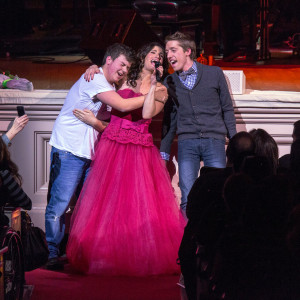Still Flying Beyond Gravity’s Pull

Idina Menzel at Carnegie Hall
Nearly a decade has passed since Idina Menzel introduced her signature song, the Stephen Schwartz anthem “Defying Gravity” in the 2003 Broadway smash “Wicked.”
With help from “Glee,” on which she sang it, it has grown in stature to become a defiant proclamation of freedom, independence, self-empowerment and the casting off of demons embraced by Everygirl U.S.A. And at Carnegie Hall on Sunday evening Ms. Menzel, accompanied by the Orchestra of St. Luke’s under the direction of Rob Mounsey, walloped it into the bleachers. (Originally scheduled for Oct. 29, the concert was postponed because of Hurricane Sandy.)
Barefoot in a billowing violet ball gown, Ms. Menzel, with her dark hair and sharp features, cut a strikingly ambiguous figure. Her stage character, Elphaba, the Wicked Witch of the West, was simultaneously gorgeous and scary: a beauty queen on a broomstick. You might say she embodied an archetypally bipolar vision of the young female self in a culture obsessed with appearances. One minute you look into the mirror and see a hag, and the next a princess. “Defying Gravity” celebrates the transcendence of that insecurity and self-loathing.
These contradictions are suggested in Ms. Menzel’s thin but penetrating soprano with its buzzing vibrato that she pushed toward stratospheric heights. The power of her voice lies in the cutting edge of its upper register and not in any rhythmic sophistication. Ms. Menzel is 41, but she displayed the stamina, high-strung temperament and willpower of a mouthy teenager determined to out-sing the competition in a talent show.
Happily, she is more than a theatrical singing machine, and the concert had some astute song choices. A heartfelt tribute to Marvin Hamlisch included a passionate, insightful rendition of “At the Ballet” (from “A Chorus Line”), which she said was his personal favorite among his compositions. Cole Porter’s “Love for Sale” was juxtaposed with the Police’s “Roxanne” into a push-me-pull-you debate for and against prostitution.
“Take Me or Leave Me,” from “Rent,” became an audience-participation number in which four young concertgoers who knew it by heart enthusiastically performed excerpts while Ms. Menzel hovered over them like an approving godmother.